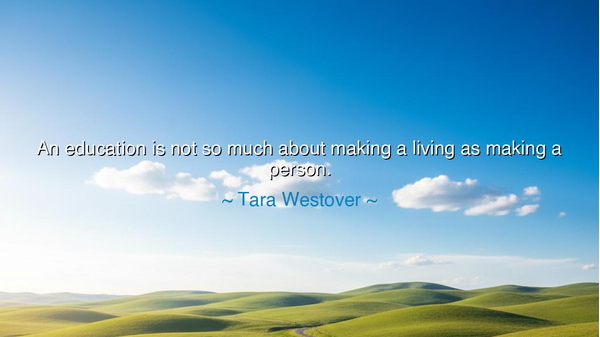
An education is not so much about making a living as making a






Tara Westover, who rose from the silence of isolation into the light of scholarship, declared with a voice forged in struggle: “An education is not so much about making a living as making a person.” These words are more than observation—they are testimony, drawn from her own pilgrimage from the mountains of Idaho, where she was denied formal schooling, to the halls of Cambridge and Harvard, where she discovered the transformative power of learning. For she teaches us that education is not merely a tool to earn wages, but a crucible that shapes the soul, awakens the mind, and creates the wholeness of a human being.
The origin of this insight lies in Westover’s memoir Educated, where she tells of being raised in a family that distrusted schools and governments. She grew up without classrooms, textbooks, or teachers—working instead in a junkyard, her body and mind shaped by labor and silence. Yet she fought her way to learning, first by teaching herself, then by entering universities. It was there she realized: the greatest gift of education was not simply the ability to “make a living,” but the ability to become a self—someone capable of choice, of judgment, of seeing the world beyond the walls of her upbringing.
History echoes this wisdom. Consider Frederick Douglass, born into slavery, denied the right to read. When he first grasped the power of letters, he knew immediately that education was the path to freedom—not only freedom from chains, but freedom to define himself as a man. He wrote later that literacy gave him his soul, his identity, his voice. Douglass’s story proves what Westover teaches: education makes a person, not merely a worker. It shapes dignity, independence, and the strength to live as more than what the world would confine us to be.
The meaning of Westover’s words is therefore heroic. A society that sees education only as a way to “make a living” reduces its children to tools of industry, gears in a great machine. But when education is embraced as the shaping of the whole person, then it becomes holy work. It nurtures empathy, imagination, courage, and identity. It equips not only the hands, but also the heart; not only the mind, but also the conscience. To see education in this way is to see life not as survival, but as becoming.
We may also recall the story of Socrates, who refused to take payment for teaching, for he believed knowledge was not meant to serve coin, but to serve the soul. He unsettled minds, inflamed intellects, and urged Athenians to “know thyself.” For Socrates, as for Westover, education was about making a person, someone capable of self-reflection, moral judgment, and pursuit of truth. The crowd may have condemned him, but his legacy endures because he taught men not how to make a living, but how to live.
The lesson for us is clear: pursue education not merely for the promise of wealth, but for the growth of self. Ask not only, “What job will this skill give me?” but “What kind of person will this knowledge make me?” For wealth can be lost, careers can change, but the formation of character, the awakening of conscience, the expansion of the mind—these remain, even in times of hardship. True education makes us free, resilient, and fully human.
Practical actions flow naturally. Read not only for exams, but for wisdom. Seek learning that challenges your assumptions, that deepens your empathy, that stretches your imagination. Parents, encourage children not just to prepare for professions, but to cultivate curiosity and virtue. Adults, continue learning beyond your work—study art, philosophy, history, and faith, for these are the stones from which a person is built. And always ask: does this knowledge help me to live more truthfully, more fully, more humanly?
So let Tara Westover’s words resound across generations: “An education is not so much about making a living as making a person.” Treasure this truth. For in the end, your living will fade, but the person you have become—the strength of your mind, the depth of your heart, the truth of your soul—this is your eternal legacy. Seek education, then, not only for bread, but for being; not only for survival, but for selfhood. In doing so, you will not just live—you will become.






AAdministratorAdministrator
Welcome, honored guests. Please leave a comment, we will respond soon